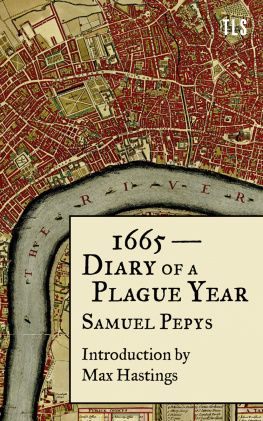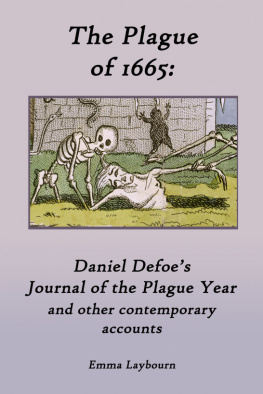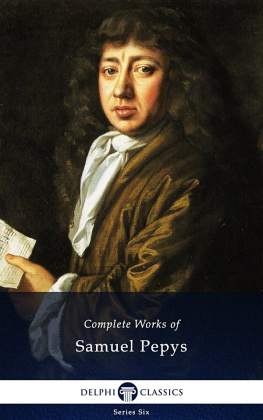Samuel Pepys - 1665 – Diary of a Plague Year
Here you can read online Samuel Pepys - 1665 – Diary of a Plague Year full text of the book (entire story) in english for free. Download pdf and epub, get meaning, cover and reviews about this ebook. year: 2020, publisher: HarperCollins Publishers, genre: Romance novel. Description of the work, (preface) as well as reviews are available. Best literature library LitArk.com created for fans of good reading and offers a wide selection of genres:
Romance novel
Science fiction
Adventure
Detective
Science
History
Home and family
Prose
Art
Politics
Computer
Non-fiction
Religion
Business
Children
Humor
Choose a favorite category and find really read worthwhile books. Enjoy immersion in the world of imagination, feel the emotions of the characters or learn something new for yourself, make an fascinating discovery.
- Book:1665 – Diary of a Plague Year
- Author:
- Publisher:HarperCollins Publishers
- Genre:
- Year:2020
- Rating:5 / 5
- Favourites:Add to favourites
- Your mark:
- 100
- 1
- 2
- 3
- 4
- 5
1665 – Diary of a Plague Year: summary, description and annotation
We offer to read an annotation, description, summary or preface (depends on what the author of the book "1665 – Diary of a Plague Year" wrote himself). If you haven't found the necessary information about the book — write in the comments, we will try to find it.
1665 – Diary of a Plague Year — read online for free the complete book (whole text) full work
Below is the text of the book, divided by pages. System saving the place of the last page read, allows you to conveniently read the book "1665 – Diary of a Plague Year" online for free, without having to search again every time where you left off. Put a bookmark, and you can go to the page where you finished reading at any time.
Font size:
Interval:
Bookmark:

Contents
Samuel Pepys (1633-1703) was a naval administrator, member of Parliament and devoted diarist. Kept between 16601669 and written in Sheltons shorthand, Pepys diary recorded major historical events, like the Plague of 1665 and the Great Fire of London alongside his more personal concerns and activities, including politics, his work in public life and rows with his wife, Elizabeth.
Max Hastings is the author of twenty-six books, most about conflict, and between 1986 and 2002 served as editor-in-chief of the Daily Telegraph, then editor of the Evening Standard. He has won many prizes both for journalism and his books, of which the most recent are All Hell Let Loose, Catastrophe and The Secret War, best-sellers translated around the world. He is a fellow of the Royal Society of Literature, an Honorary Fellow of Kings College, London and was knighted in 2002. He has two grown-up children, Charlotte and Harry, and lives with his wife Penny in West Berkshire, where they garden enthusiastically.
Welcome to London in lockdown in 1665
The plague that swept through London in 1665 brought the city to a grinding halt. The bustle of business gave way to a grim air of fear as nearly a quarter of Londoners were struck down. Yet for Samuel Pepys, life went on.
In his lifetime, Pepys was a naval administrator and a friend and colleague of the powerful and learned. For nearly ten years he kept a private diary in which he recorded life in Restoration London, commenting on politics, public events and private matters. As well as recording public and historical events, Pepys paints a vivid picture of his personal life, from his socializing and amorous entanglements, to his theatre-going and his work at the Navy Board. Unequalled for its frankness, high spirits and sharp observations, the diary is both a literary masterpiece and a marvellous portrait of seventeenth-century life.
In 1665 that life was lived under an ever-present shadow of death, and Pepys offers us a glimpse into how that affected London and Londoners alike.
The Times Literary Supplement was born in January 1902. Its first ever front page bashfully stated that during the Parliamentary session Literary Supplements to The Times will appear as often as may be necessary in order to keep abreast with the more important publications of the day. Fortunately, the question of necessity was not left in the hands of literary journalists (who, we can imagine, might occasionally push for a holiday or two), and the title became a weekly one. A few years later, the TLS split entirely from The Times.
Since then, we have prided ourselves on being the worlds leading magazine for culture and ideas. Our guiding principle for the selection of pieces remains the same as it ever has been: is it interesting; and is it beautifully written? Over the years, our contributors have included the very best writers and thinkers in the world: from Virginia Woolf to Seamus Heaney, Sylvia Plath to Susan Sontag, Milan Kundera to Christopher Hitchens, Patricia Highsmith to Martin Scorsese.
The book you are holding is part of a brand new imprint, TLS Books, by which we are striving to bring more beautiful writing to a wider public. We hope you enjoy it. If you want to read more from us, youll find a special trial subscription offer to the TLS at the back of this book.
In an ever-quickening culture of flipness and facility, fake news and Facebook, the TLS is determined to be part of the counter-culture of quality. We believe in expertise, breadth and depth. We believe in the importance of ideas, and the transformative power of art. And we believe that, in reading the TLS in whatever form, be it in a magazine, online or in a book you are supporting a set of values that we have been proud to uphold for more than a hundred years. So thank you for that.
Stig Abell, Editor-in-chief, TLS Books
London, 2020
One summers day long ago, a government bureaucrat recorded a resolution to set his worldly affairs in order, the season growing so sickly, that it is much to be feared how a man can scape having a share in it for which the good Lord God bless me, or be fitted to receive it. This officer of the Crown was, of course, Samuel Pepys, and the year was 1665. Bubonic plague raged, killing thousands a week in London with a population of less than 400,000. Pepyss great diary lays bare the terrors, horrors and the abyss of ignorance which prevailed almost four centuries ago. But these are matched today under the menace of the coronavirus. Only the rates of mortality, God be thanked the words the diarist himself would have used have so far been vastly lower in our own era.
The plague was just one among a procession of disasters and upheavals of Pepyss time that he recorded in his diary, interwoven with the minutiae of his daily life, between January 1, 1660 and May 31, 1669. He then abandoned the chronicle, which was already over a million words in length, believing that penning it each evening by candlelight was fatally weakening his eyesight. The portrait that he painted of Britain, and more especially of London, is one of the most important historical narratives ever compiled. He details court intrigue, his own role as a key manager of the Royal Navy in the Dutch Wars, the Fire of London and, of course, the plague. Moreover, thanks to the diary we know more about the life and thoughts of its author than those of any other human being until the twentieth century. If he was not a great man, he achieved a great thing.
Born in 1633 in Salisbury Court, off Fleet Street, Pepys was a tailors son whose brains, industry and unexpectedly influential connections enabled him to study at St. Pauls School, and then at Magdalene College, Cambridge. As a teenager he witnessed the execution of King Charles I in 1649, then got his start in government service under the Commonwealth. On October 10, 1655, he married the fourteen-year-old Elisabeth de St. Michel, a descendant of French Huguenot immigrants. Their subsequent relationship was fractious and childless the latter much to Pepyss sorrow. His almost obsessively priapic enthusiasms never ceased to include Elisabeth, but also included a long succession of chance encounters and steady relationships, one with the wife of a man who pimped her in pursuit of government custom; another with his wifes paid companion Deb, whom he loved to distraction.
As a young man Pepys suffered agonies from bladder stones, so great that on March 26, 1658 he bore the mortal risk and terrible pain of having them surgically removed. Every year thereafter, he celebrated and recorded the anniversary of this event, which transformed his health for the better, though bladder problems recurred in his later life. Following the Restoration of King Charles II in 1660, Pepys prospered as a protg of the Earl of Sandwich. In 1665, the year of this selection from the diary, he rose to become Surveyor of Victuals for the Navy and Secretary of the Tangier Committee, an important body which managed Britains short-lived North African colony. In his diary he also wrote constantly about his finances: increasing his own income was a perennial obsession, as it is for most of mankind. Although only mildly corrupt by the standards of government servants of his time, he contrived to become a modestly wealthy man. He noted the irony that 1665, a terrible year for many British people, was an unprecedentedly profitable one for himself.
Font size:
Interval:
Bookmark:
Similar books «1665 – Diary of a Plague Year»
Look at similar books to 1665 – Diary of a Plague Year. We have selected literature similar in name and meaning in the hope of providing readers with more options to find new, interesting, not yet read works.
Discussion, reviews of the book 1665 – Diary of a Plague Year and just readers' own opinions. Leave your comments, write what you think about the work, its meaning or the main characters. Specify what exactly you liked and what you didn't like, and why you think so.






